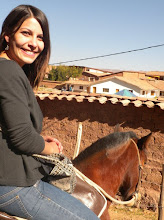It's been quite a whirlwind of a week, but I am finally settled into my beautiful apartment. My puppy (yes, a puppy...) is sleeping on the rug, and I have a steaming cup of earl grey tea at my bedside. Although I'm sick--stomach problems and a cold? (can people get colds during the summer???)--I'm feeling perfectly content.
This past week I did a lot of traveling in the villages. The first place, Kanibodom (bodom = a Tajik nut) is in the western Fergana Valley. I had meetings with the teachers to discuss our programs there and my role, and I visited the classrooms and met the students. There was a little bit of downtime, so I asked the girls, who pretty much held onto my curtails, if they could show me their village. We walked around the dusty roads through their village and saw a beautiful, ancient mosque and minaret. The town is incredibly small, but the people here are so proud of their village and were extremely excited to show me around. Kanibodom is absolutely beautiful. There is a kind of peacefulness in the air, the kind of tranquility I needed after leaving Dushanbe. When I first stepped foot in this small village, I realized why I had applied for Tajikistan and why I wanted this Fulbright grant. This is the Tajikistan I had dreamed about, and I am so grateful to learn from these girls in the villages and share cultural experiences.
The girls were wonderful and extremely bright. They are planning on studying in the United States on a FLEX scholarship, which entails a rigorous entrance exam. They are also very involved in their local community. One girl, who is in her second year of language study and has nearly perfect English, started a program to help people with disabilities in her village. I'm just really impressed with everyone here. Yes, we of course talked about Justin Bieber, Twilight, and A Walk to Remember (one girl's all-time favorite movie), but over the course of our conversations, I began to understand the connection we all share, no matter geography or background. They invited me to their homes next time I'm in town so I can meet their families and stay the night. I am definitely going to take them up on that.
As for my work there, I will be teaching English classes and lead cultural activities (i.e. Halloween). I am also hoping to get TOEFL certified and teach free TOEFL classes in the villages. I'm trying to figure out the funding problem. It's about $300 for certification. I've had meetings with several directors of non-profits and the U.S. Embassy but no such luck. I'm sure funding for TOEFL is somewhere, even if I pay out of my pocket. A TOEFL class in the villages would be a great asset. The classes here are so expensive and not taught by native English speakers. Passing the TOEFL exam is also a requirement to apply for university out of country. Everyone I've met wants to study in the United States, and I think U.S. universities would greatly benefit from enrolling Tajik students. Anyway, before I close this post, I found this quote which sums up my feelings about Northern Tajikistan:
"It is only when we silent the blaring sounds of our daily existence that we can finally hear the whispers of truth that life reveals to us, as it stands knocking on the doorsteps of our hearts."
